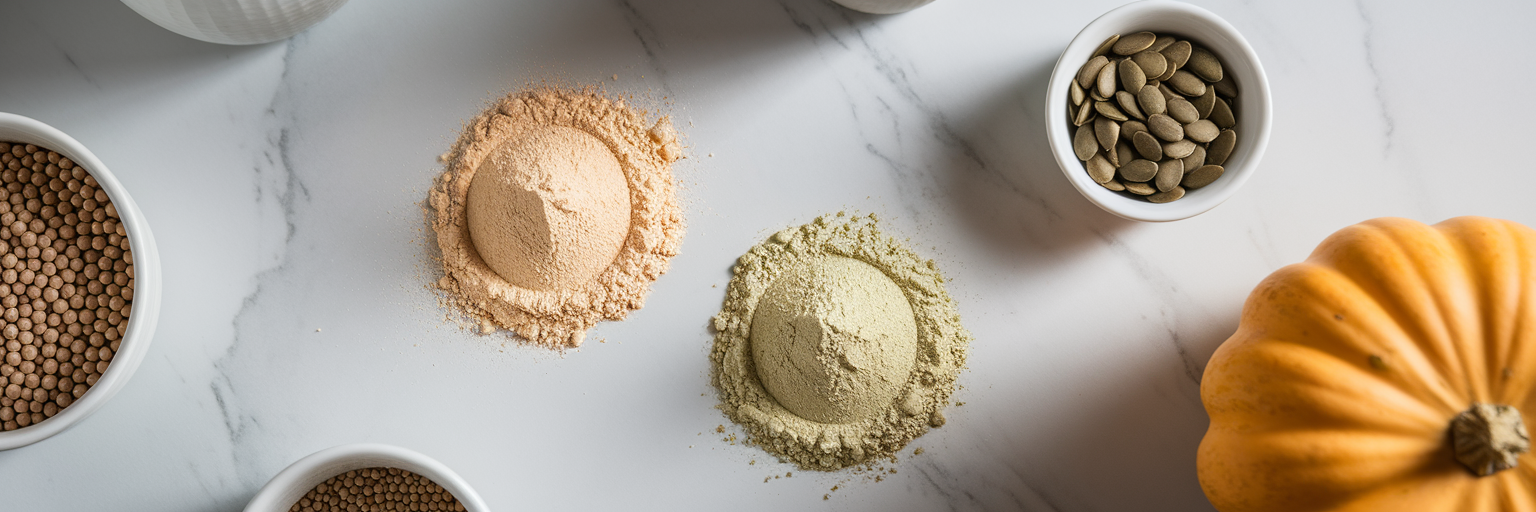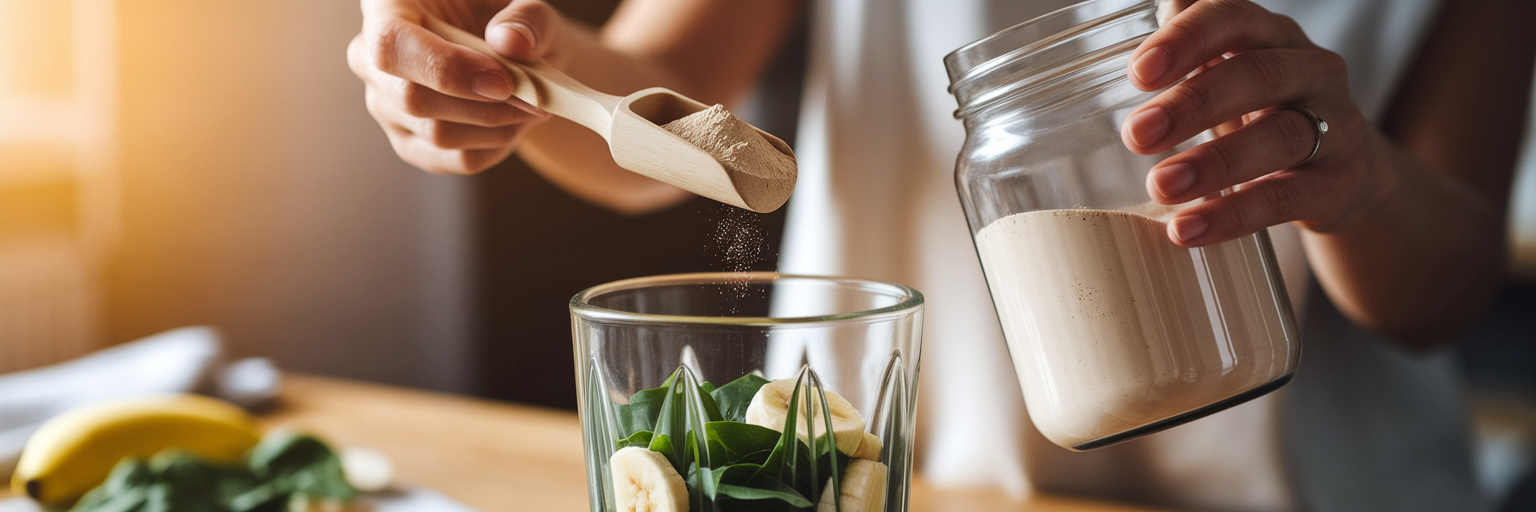You found a vegan protein powder you were excited about, blended it into a delicious smoothie, and then… your stomach started talking back. If you’ve ever felt bloated or uncomfortable after a protein shake, you are definitely not alone. It’s a common frustration, but it doesn’t mean you have to give up on the convenience and benefits of plant-based protein.
The issue often isn't the protein itself, but the company it keeps. Plants have natural defense mechanisms, including compounds like lectins and phytates. These "anti-nutrients" can sometimes interfere with digestion and make it harder for your body to absorb minerals. Additionally, many plant-based powders are high in fiber. While fiber is fantastic for gut health, a concentrated dose in a single scoop can be too much of a good thing for a sensitive system, leading to that all-too-familiar discomfort. Understanding how to avoid protein powder bloating starts with recognizing that not all plant proteins are created equal.
The good news is that the protein source, how it's processed, and what else is in the tub make all the difference. Let's look at the specific ingredients that might be causing trouble.
Why Your Protein Powder Might Be Upsetting Your Stomach
That feeling of digestive unease after a protein shake is a shared experience for many. You’re trying to do something good for your body, but it ends up feeling just the opposite. The truth is, this is a widespread issue, and it often comes down to the natural composition of plants and how they are processed.
Plants contain natural compounds like lectins and phytates, which can sometimes interfere with digestion. Think of them as a plant's natural armor. For some people, these compounds can make it harder for the stomach to break everything down smoothly. Another factor is fiber. Plant-based foods are packed with it, which is generally great for us. However, when concentrated into a powder, that high fiber content can overwhelm a sensitive gut, leading to gas and bloating. It’s a classic case of “too much of a good thing.”
So, if you're wondering how to avoid protein powder bloating, the first step is to understand that the source of the protein and the other ingredients in the blend are what truly matter. The discomfort isn't a sign that you should avoid vegan protein altogether, but rather a signal to choose your powder more carefully. The next step is to identify the common culprits often added to these formulas.
Common Culprits Hiding in Your Protein Shake

Moving beyond the natural properties of plants, the ingredient list on your protein tub often holds the biggest clues. Manufacturers add various ingredients to improve taste, texture, and shelf life, but some of these can be tough on a sensitive gut. Finding a vegan protein powder sensitive stomach formula means learning to spot these potential irritants.
Here are a few common ones to watch for:
- Soy Protein: While a complete protein, soy is a common allergen and contains compounds that can cause bloating and gas in individuals who are sensitive to it.
- Artificial Sweeteners & Sugar Alcohols: Ingredients like erythritol, xylitol, and sorbitol are popular because they add sweetness without calories. However, our bodies can't fully digest them. They travel to the colon, where gut bacteria ferment them, which can produce gas and cause digestive upset.
- Thickeners & Gums: Have you ever noticed how creamy some protein shakes get? That’s often thanks to xanthan gum or guar gum. These agents can slow down digestion, leaving you with a heavy, uncomfortable feeling in your stomach.
- High-Fiber Additives: Some brands add extra fiber like inulin or chicory root to boost the nutritional panel. In concentrated doses, these can be too much for the digestive system to handle at once, leading to cramping and discomfort.
Understanding these ingredients is the first step to finding a superior blend. You can see what goes into some of the best protein powders on the market to get a better idea of quality formulations.
| Ingredient Category | Common Examples | Purpose in Powder | Potential Side Effect |
|---|---|---|---|
| Certain Protein Bases | Soy, some wheat proteins | Primary protein source | Allergenic reactions, bloating |
| Sugar Alcohols | Erythritol, Sorbitol, Xylitol | Low-calorie sweetening | Gas, bloating, laxative effect |
| Gums & Thickeners | Xanthan Gum, Guar Gum, Carrageenan | Improve texture and mouthfeel | Slowed digestion, intestinal distress |
| Added Fibers | Inulin, Chicory Root Fiber | Boost fiber content, act as prebiotic | Excessive gas and cramping |
Note: This table highlights ingredients that are frequently associated with digestive discomfort. Individual tolerance can vary greatly.
What to Look For on the Label
Now that you know what to avoid, let's focus on the positive. Shopping for a gentle protein powder becomes much easier when you have a clear checklist. It’s all about empowering yourself to read the label and make an informed choice that your stomach will thank you for.
Seek Simplicity: The 'Less is More' Rule
Your best bet is often a powder with a short, recognizable ingredient list. If you can’t pronounce half the ingredients, it might be a sign that the formula is overly processed. Look for powders that prioritize the protein source and keep additives to a minimum.
Look for Digestive Enzymes
Some of the best formulas include added digestive enzymes like protease, amylase, and lipase. These enzymes help break down the protein, carbs, and fats in the powder before they have a chance to cause trouble. This makes for an easy to digest vegan protein that is much gentler on your system. As explained by the Cleveland Clinic, digestive enzymes are essential for breaking down the food we eat into nutrients the body can absorb.
Consider Probiotics and Prebiotics
A healthy gut is a happy gut. Powders that include probiotics (good bacteria) and prebiotics (food for that bacteria) can help support your overall gut microbiome. A balanced gut environment is more resilient and better equipped to handle different foods, including protein supplements.
Check for Third-Party Certifications
Seals from organizations like NSF or Informed-Sport provide an extra layer of trust. These certifications guarantee that the product has been tested for purity, potency, and the absence of contaminants or unlisted ingredients. It’s a simple way to ensure what’s on the label is what’s in the tub.
Top Plant Protein Sources for Easy Digestion

With so many options out there, it helps to have a "safe list" of protein sources known for being gentle on the stomach. When you're searching for the best plant protein for digestion, these four consistently stand out for their digestibility and impressive nutritional profiles.
- Pea Protein: This is a powerhouse in the plant-protein world. It's naturally hypoallergenic, meaning it’s free from common allergens like dairy, soy, and gluten. Pea protein is also rich in branched-chain amino acids (BCAAs), which are vital for muscle support and recovery, making it both effective and gentle.
- Pumpkin Seed Protein: Don't overlook this green giant. Pumpkin seed protein is not only easy to digest but also packed with valuable micronutrients like magnesium, zinc, and iron. It has a slightly nutty flavor and offers a well-rounded nutritional boost beyond just protein.
- Sunflower Seed Protein: Made from the hearts of sunflower seeds, this protein is celebrated for its neutral flavor and smooth texture. This makes it incredibly versatile for shakes, baking, and more. It also boasts a complete amino acid profile, providing all the essential building blocks your body needs.
- Sprouted Brown Rice Protein: The key word here is "sprouted." The sprouting process fundamentally changes the composition of the rice grain. It reduces the anti-nutrients we talked about earlier and "wakes up" enzymes, which helps pre-digest the protein. This makes it significantly easier on the stomach than standard rice protein.
Once you've found a protein source that works for you, the fun begins. You can easily incorporate it into delicious meals, like in these 3 easy vegan protein recipes you'll actually crave.
How to Introduce a New Protein Powder Safely
Even with the perfect powder, your body might need a little time to adjust. Instead of jumping in with a full serving, a slow and steady approach can prevent digestive surprises and help you gauge your tolerance. Think of it as a friendly handshake between your gut and your new protein.
- Start Low and Go Slow: Don't start with a full scoop on day one. Begin with a quarter or half serving for the first few days. This gives your digestive system a chance to adapt without feeling overwhelmed. You can gradually increase the amount as you feel comfortable.
- Time it Right: Taking protein powder on an empty stomach can sometimes be too intense. Try blending it into a smoothie with fruit and a healthy fat like avocado or almond butter, or stir it into a bowl of oatmeal. The other food acts as a buffer and aids digestion.
- Keep a Symptom Journal: This might sound tedious, but it’s incredibly insightful. For a week, jot down what time you took the protein, how much you had, and how you felt afterward. This simple practice helps you listen to your body and pinpoint exactly what works for you.
Armed with this knowledge, you're ready to find a protein that feels great. Feel free to explore our collection of thoughtfully formulated products to see these principles in action. If you have more questions about ingredients or how to choose, our FAQs page is a great resource.
Innovations in Gut-Friendly Protein
The quest for the perfect plant protein is always moving forward, and exciting new methods are making them more digestible than ever. Two key innovations are leading the charge in creating gut-friendly formulas that work for even the most sensitive systems.
First is fermentation. Much like the process used to create yogurt or kimchi, fermenting plant proteins essentially "pre-digests" them. This process breaks down those tricky anti-nutrients and plant fibers, making the protein and other nutrients more bioavailable and much easier for your body to absorb.
Another significant development is the rise of low FODMAP protein powder. FODMAPs are specific types of carbohydrates that can be difficult to digest for people with sensitive guts, particularly those with IBS. Formulations designed to be low in these compounds offer a targeted solution for digestive comfort. This focus on gut health is backed by significant research, with studies in publications like the Gastroenterology Journal highlighting the effectiveness of low-FODMAP diets for managing symptoms.
Ultimately, finding the right vegan protein powder is a personal journey. It’s about becoming an informed consumer, paying attention to labels, and most importantly, listening to your body. With the right knowledge, you can absolutely find a protein that supports your health goals without compromising your digestive peace.



